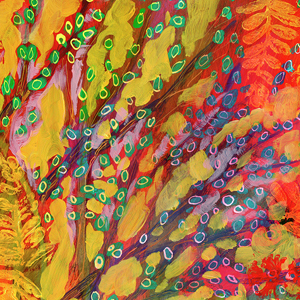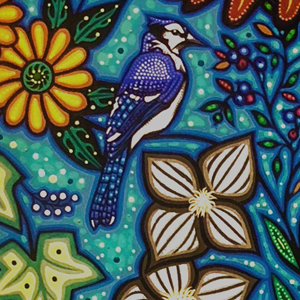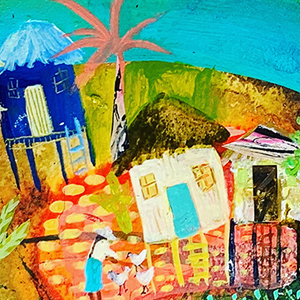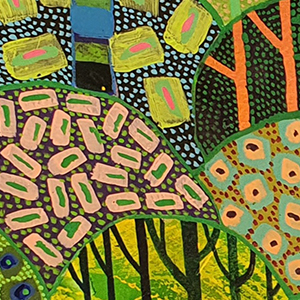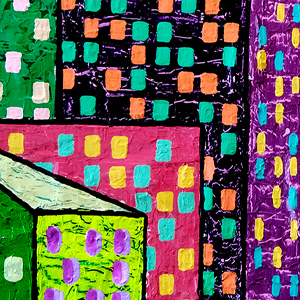
Interlude
Seeing the Good
An Interview with Fr. Greg Boyle
Artwork: “Looking for Light” by Jim Aproberts © 2019
Greg Boyle’s 2010 bestselling book, Tattoos on the Heart: The Power of Boundless Compassion, has been an inspiration to our work at the Institute for Social Concerns. In the book, Boyle writes, “our common human hospitality longs to find room for those who are left out.” For Boyle, this hospitality looks like radical kinship, based on unconditional love, in which people are welcomed into relationship, needs are met as they arise, and the circle of compassion grows as voices on the margins are heard and embraced. At Homeboy Industries, the largest gang-intervention, rehabilitation, and re-entry program in the world, what some might call entrepreneurship is less about programming and more about responsiveness driven by love—which has resulted in schools, job creation, mental health counseling, tattoo removal, and countless other interventions. At the heart of all these interventions is a community grounded in radical love and belonging. Father G is known for telling stories, and his life is, indeed, a storied existence—not a strategic plan, but an embodied response to believing the ultimate reality is one of love, and that we flourish when our lives and relationships reflect the abundance of that love to others.
We sat down with Fr. Boyle to discuss his work over almost 4 decades, and how his generous vision of human goodness and dignity continues to have implications for social change. He spoke to us online from his office at Homeboy Industries, with a steady stream of knocks on the door and people vying for his attention. Although this interview has been edited for length and clarity, we wanted to note the original transcripts were full of the starts, stops, interruptions, and distractions, which are the lived reality of practicing radical hospitality.
Suzanne Shanahan: Thank you for taking time to be with us. You were born and raised in Los Angeles, and you have spent most of your adult life ministering there. But when you first became a priest, you lived in Bolivia for a season. Can you tell us a little about that time and how it shaped you?
Greg Boyle: Sure. Thank you for having me.
Almost 40 years ago, when I was first ordained, Bolivia was the poorest country in the Western hemisphere, was poorer than Haiti at that time, and had a lot of political strife and endless strikes. My time in Bolivia kind of turned me inside out in terms of the poor and finding myself evangelized by the poor, being led to understand the gospel in a particular way, by way of folks who were really poor at the time.
SS: I imagine this experience of solidarity with the poor—both the relationships with particular people and the experience of broken systems—provided a foundation for the work at Delores Mission, the poorest parish in the Los Angeles archdiocese. How did you experience that transition?
GB: Well, I was supposed to go to Santa Clara to campus ministry and I begged my provincial to let me go to Delores Mission. I’d been there right after I was ordained, for two summers, and I knew the place. And then one of the pastors decided to go back to Mexico, so I would fly back almost every weekend to help with masses. That intensified and solidified my desire to be there. So I said, “Can’t I go here instead of Santa Clara?” He was actually happy to send me there.
SS: When you moved to Dolores Mission there were a lot of gang-related concerns in Los Angeles. How did you get started in the work that became Homeboy?
GB: We just started to respond to what was in front of us, and what was in front of us were gang members—junior high age gang members who had been get kicked out from their schools. No one wanted them, so they were wreaking havoc in the middle of the day. I said, “what if I found a school that would take you?” And they all said, “yes, I would go.” And then I couldn’t find a school that would take them. So we started a school. That was the first thing.
And then they said, “if only we had jobs.” And so we tried to find felony friendly employers. And we started maintenance crews, landscaping crews, a crew to build our childcare center—all made up of members of the 8 rival gangs. And then we started Homeboy Bakery right after the unrest in the early nineties. So, we eventually changed our name to Homeboy Industries. It all evolved, and still it’s evolving. But I was also burying so many kids during that period.
SS: I know all this work has been written about elsewhere, and that what you’re sharing is a small summary of decades of gang rehabilitation, job training, running businesses, and providing the practical services people need to leave gangs, such as tattoo removal and mental healthcare. There were starts and stops, a bakery fire, and even community resistance in the early days. And, as you said, you were conducting funerals for youth killed by gang violence regularly. Many people might see the problem as overwhelming and give up. But you didn’t.
GB: You know, in those days, frankly, we had 8 gangs at war, and I did a lot of things I’d never do again—like shuttle diplomacy and peace treaties and truces and cease fires. I’d never do that stuff again, because it’s born of a bad analysis. There was definitely violence, but there was no conflict, and you can only have peace treaties if there’s an actual conflict. But I learned early on that in the end the gang problems were really about something else. So you want to address the something else.
I could see goodness in everybody. It was never qualified in anybody. It was just there. And then you start to recognize other things. Oh, this is despair that presents as violence, and this or this is mental illness that presents that way, or this is trauma and the accumulation of complex trauma. I never saw it as “this guy’s a good guy, and this guy’s a bad guy.” Probation officers were saying those things. They were saying, “Don’t even bother with that guy. He’s really pure evil.” And I knew right away that wasn’t true, just because my experience was telling me otherwise.
SS: That reminds me of how you have described kinship, as a circle of compassion where “we stand with the demonized so the demonizing will stop” and all souls feel their worth. It’s a beautiful idea that has become embodied over the years in the community you have built. That gift you possess of seeing the dignity and worth of each person, of seeing the goodness even when there are actions that are not good, seems central to the work.
GB: Oh, yeah. This was started during the decade of death. 1988 to 1998 was just intense. We had a thousand gang related homicides in ’92. That’s changed, certainly, and the numbers have been cut significantly. I think everyone, even law enforcement, would attribute a lot of the change and mentality as coming from Homeboy.
SS: So if you think about the start of Homeboy almost four decades ago, and you look at where the community is today, are the challenges in the community different than they were when you started this work in Dolores Mission?
GB: Today, the violence is obviously not as intense as it was as it was during the decade of death. But another thing that has changed is that the country is in the grip of a mental health crisis. And it was exacerbated by COVID, and then it kind of landed in a solidifying moment. But if you’re talking about health or mental health, you know you’re really talking about healing trauma. And you’re also talking about infusing hope in folks for whom hope is foreign. And you’re also talking about mental health services in a really concrete, specific way. Those are the things that address gang violence today, and young people are gravitating in that direction. SS: How is Homeboy trying to address mental health questions?
GB: It’s never limited to 50 minutes with the therapist. We do that, but it’s more holistic. It’s a therapeutic community. It’s a wraparound experience. It’s “everybody holds a piece” and “everybody’s delivering a dose.” We’re not limited in who are the suppliers of care in the delivery system. They’re bombarded with it. And even if they wander away or relapse or go to jail again, they all come back because they’ve had this palpable dose of cherishing and tenderness and acknowledgement, and they feel seen. And because that’s really compelling, they come back.
SS: Which is in many ways the same thing you have been doing all along—living a radical ethic of hospitality and care that sees deeper than the immediate circumstances and loves unconditionally. This has certainly produced change in Los Angeles, and I hear you have a new book coming out that applies these ideas more broadly to the current moment in America.
GB: Yes. It’s called Cherished Belonging: The Healing Power of Love in Divided Times. It’s kind of a different book than my others in as much as it’s trying to comment on the times in which we are living. There really is a mental health crisis, but people think when you say mental health it’s somehow diagnostic—it’s about schizophrenia or bipolar disorder. So sometimes it’s better to just talk about health.
Healthy people are holy people and holy people are healthy people, and I don’t think there’s any way around that. I mean, I was watching Ken Burns’ really excellent commencement address that he gave at Brandeis, and it’s really quite good, but at one point he talks about these binary choices, you know the virtuous or the vulgar. And I thought, “Well, who do you think the vulgar people are?” That’s kind of important. If you think vulgar people are just bad, well, that’s kind of the end of the discussion. I think it indicates that we’re not even trying if we just say, “well, these people are bad, and they don’t belong to us.” But nobody vulgar is healthy. So how do we help people? How do we walk them to health?
None of us are well until all of us are. And in all of us, there is a certain degree of not being well, and our growth in health will end in the graveyard. It’s a way of keeping us from declaring people really, really bad.
SS: So if what you’re saying is, it’s not about good people and bad people or even good behavior and bad behavior. It’s about wellness and unwellness. Then the question is how do you create a well, healthy population?
GB: Anybody who walks through these doors has the wellness enough to be able to walk through the doors, but they’re really wounded. So how do you heal the wound? We’ve traditionally punished the wound, which is why our prisons are overflowing. But what if we were to say, that requires health, not denunciation. If you believe people aren’t good, and if people don’t belong to us, you can denounce them. But here we embrace two principles: Everybody’s unshakably good, and there are no exceptions, and we belong to each other, no exceptions.
SS: What do you think it would it look like, more broadly, if we could embrace those principles?
GB: Recently I shared those two principles at an LA Times festival of books to a packed auditorium, and then I said, “Now do I think if we as a society embrace those two principles, do I think all our vexing, complex social dilemmas would disappear?” And then I said, “Yes, I do.” And the whole auditorium burst into laughter, and I was kind of startled. When it subsided, I said, “Yes, I do.” And I do, because I think it’s precisely the thing that ends conversation. So when a Republican Congressman says, “What can I do about this mass shooting in Nashville? There’s nothing we can do. How do you legislate against evil?” Well, that’s the sound of somebody giving up. Because if you think it’s about evil, then obviously you have to throw up your hands. But if you think it’s about health, and perhaps even people having access to guns who aren’t well, then suddenly you can roll up your sleeves, hey? There’s something we can actually do.
SS: And in all this good but difficult and long work, what sustains you?
GB: Well, you know, if I can be attentive to the folks who are here—and it’s hard to do, because it’s a lot of pulling and tugging and pay attention to me—But even so, if I can be attentive and if I can practice being able to cherish with every breath I take—Otherwise you’re not anchored in the present moment, and then it won’t work—But as long as I can do that, it’s always eternally replenishing. Fr. Greg Boyle is a Jesuit priest and the founder and director of Homeboy Industries, the world’s largest gang intervention and rehabilitation program.
Fr. Greg Boyle is a Jesuit priest and the founder and director of Homeboy Industries, the world’s largest gang intervention and rehabilitation program.
Fall 2024
Part I: Abundant Virtue
Laurie L. Patton
Sarah A. Schnitker
Patricia Snell Herzog
Melissa Fitzpatrick
Dirk Philipsen
Interlude: Generous Eyes, Radical Love
Fr. Martin Lam Nguyen, CSC
Part II: Abundant Vocation
MORE






